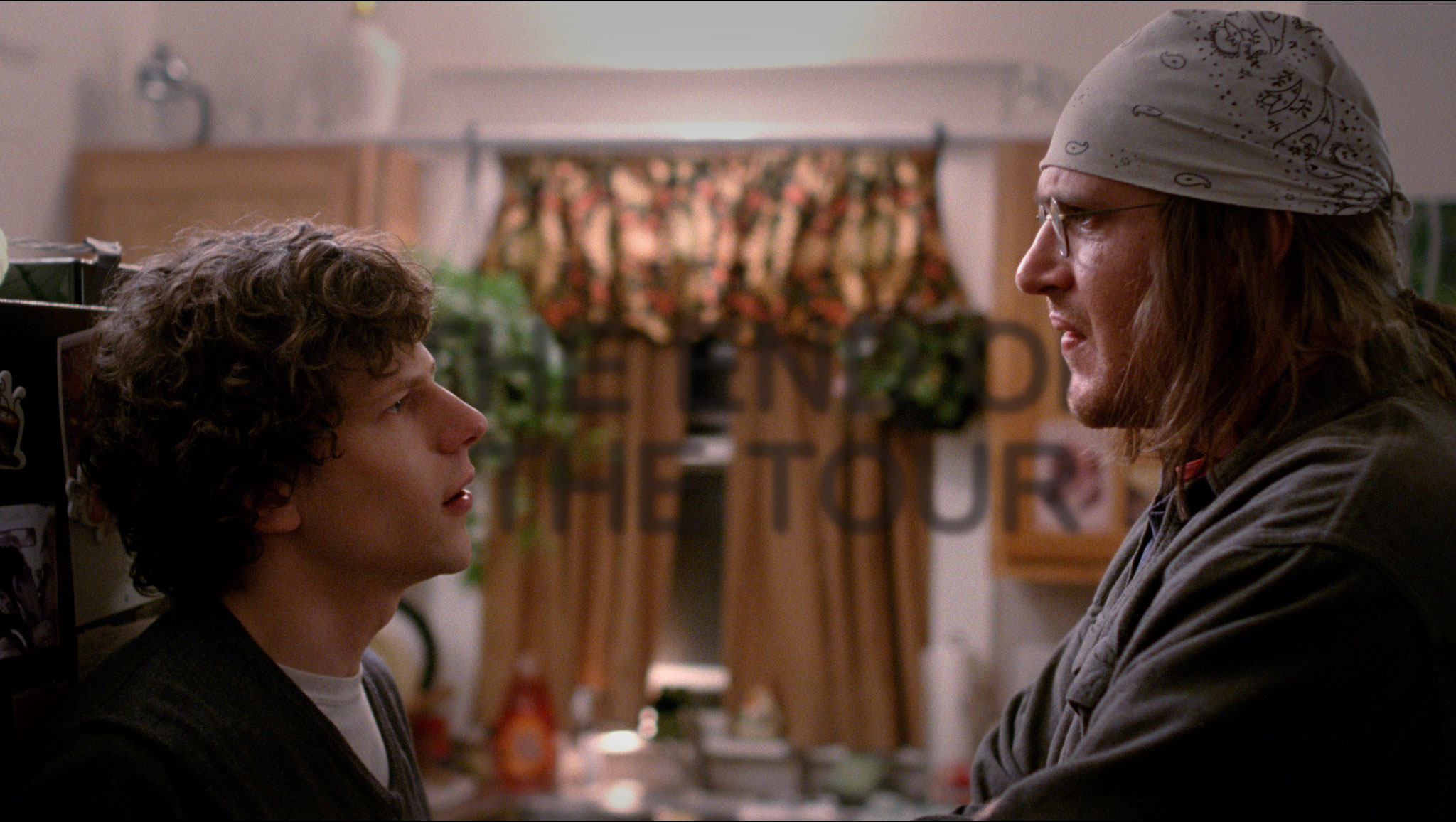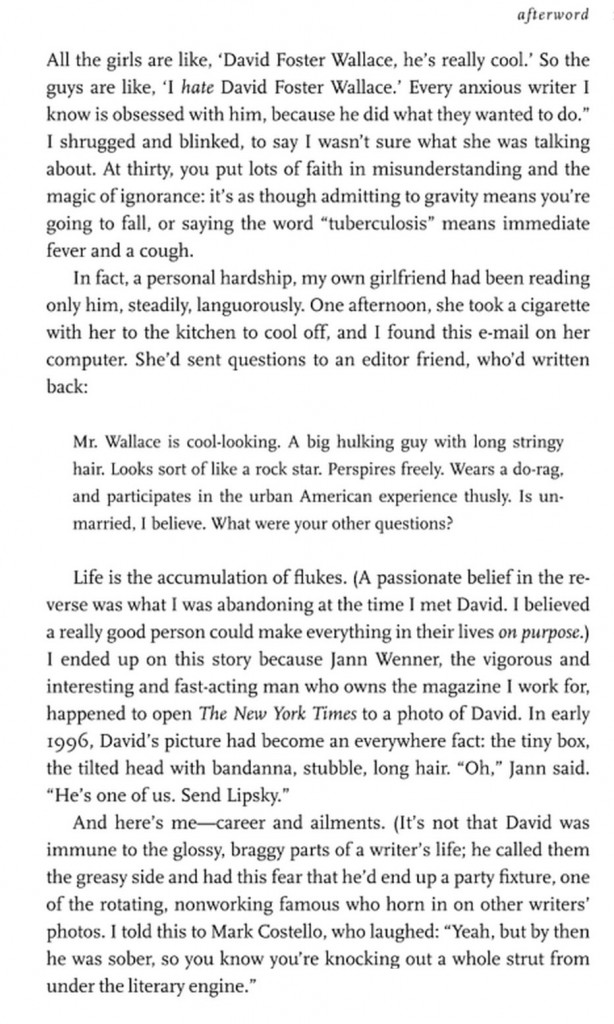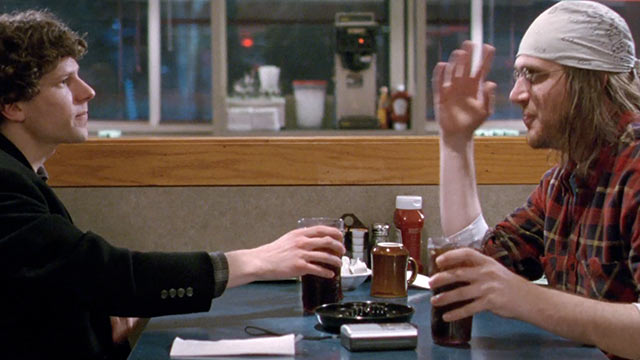The End of the Tour Movie Review
I have a mixed relationship with the movie, ‘The End of the Tour’. So this is going to be a fairly complicated conversation with the movie. But first, I’m getting ahead of myself. I’ve stated this here before, but I guess I have to assume you are new around here, David Foster Wallace was the greatest author in the English language. Hands down. Done. No conversation necessary.
And if you’ve read him at all, I know you’ll agree. If you want to be able to say that you’ve read Mr. Wallace, like at all, why don’t you try reading this, or this, or maybe this. But maybe his most famous piece would have to be, ‘Consider the Lobster’, wherein David Foster Wallace defended lobsters from inhumane boiling while attending a Lobster Festival in Maine, which… I might add, he wrote for the magazine Gourmet, of all things. I kid you not. They ran it. Seriously. Gourmet magazine ran a piece by DFW talking about how horrible it was to boil a lobster. Let’s state the obvious… you have to be a world renowned author to pull that action off. They aren’t going to let me pull that off. No. No sir. So yeah, go ahead and read a few of those pieces by DFW and you will understand this review a whole lot better. (Is it bad to make people leave your movie review in order to read some of the finest writing that has ever been produced? No. I isn’t. No go read, and then come back.)
But it wasn’t his investigative reporting that made him famous, it was his fiction. Specifically a little book called Infinite Jest. The book is so good, I am constantly and perpetually reading it… in hard cover. (It’s the only hard cover book that I read anymore.) The book begins at the end, proceeds for over a thousand pages – including 200 pages of footnotes – and circles back on itself to the beginning of the story all over again. Thus the infinite readability of it. The Infinite Jest though is in reference to an entertainment that was circling the near future on VHS, of an underground movie so entertaining that it ultimately would kill the viewer. As people would go to see if the person watching the movie was ok, they too would be locked in on watching the movie, over and over again, until they too died. The only way the movie stopped killing people was by the sheer fact that the view of the screen was obstructed and emergency responders figured out what was going on. But to say that is what the Infinite Jest is all about would be silly. It’s also about the nature of addiction and addictive personalities which is set in a AA type facility for recovering addicts. It’s about hiding these addictions and avoiding being found out as a fraud. This side of the story is told at the Enfield Academy, which is a Tennis Academy for the young tennis elites of the nation.
The Infinite Jest is a book that rings true to me and my heart. It is the most real thing I’ve ever read. But even with that said, I don’t know if I recommend it to everyone. If you like word play and clever inside out writing, sure. But if you don’t enjoy polysyllabic word play (see what I did there?) just don’t even try. It wouldn’t be worth it to you.
So all that just sets up who David Foster Wallace is. (Which, I have to say, if you don’t know who DFW is, then why are you looking for reviews of The End of the Tour?!) He was – was being in the past tense, mainly because he committed suicide back in 2009 I believe.
To set up the movie, it was based on a book entitled, “Although Of Course You End Up Becoming Yourself: A Road Trip with David Foster Wallace” by David Lipsky, which was based on a week long conversation between David Foster Wallace and Mr. Lipsky. “Although Of Course” was a phenomenal book. And I recommend it in its own right mainly because it is just two guys talking about life, the universe and everything… and doing it brilliantly. And oh, by the way, its also, as it turns out, a fantastic script. Because ‘The End of the Tour’ takes whole cloth from the Lipsky book… and they should have too, because it really is a fantastic book. Wait, here, here’s a random swab of Lipsky’s book for good measure:
And this section of the book, incredibly, ends up a large support and undergirding of the entire movie. Lipsky’s girlfriend and DFW become substantially intertwined in the movie. It’s fascinating.
But my confliction, utter conflixity(?), began when the movie was first announced. Being a huge DFW fan-boy, when the Wallace Foundation speaks I listen. When David’s wife speaks out against something, I listen. And they didn’t just speak out against the coming movie, they yelled it loud and clear… DAVID WOULD HAVE HAD NOTHING TO DO WITH THIS MOVIE. And so I backed away from the movie. I’d have nothing to do with it I said.
Then reviews started coming in. And they were stellar. Fans weren’t quite as hot on the movie, but the movie reviewing community adored it from beginning to end. Which for me? IS PERFECT. My tastes tend to follow the critical movie reviewing community more so than the general movie going public. Yeah, pompous. I know. But I tend to like headier fare than most. Don’t believe me? And it seemed like The End of the Tour would be square in the center of this upper right quadrant of goodness for me.
General End of the Tour Thoughts
When you create a movie that is simply a conversation between two people that don’t know each other already, two heady, intellectuals, striving to understand life and their place in it, you are going to get a LOT of talking. And The End of the Tour is nothing if not an amazing dialogue movie. (Which means I’ll definitely need to update my 10 best dialogue movies list now for sure.)
But it isn’t about the talking, or the witty dialogue. It’s about the fact that there once was a guy who saw very very clearly, that success, and materialism, and prestige, really isn’t all that. There once was a guy who wrote about the fact that addiction is just a medication for avoidance of the pain that we all share. Chronic cosmic sensate cluster migraines is the natural logical conclusion to a normal life and everyone that is curious and non-medicated (read, non-addicted to numbing medications, say alcohol, drugs, sex, violence, etc) will feel. That he might have had the IQ of Einstein and the writing chops of Shakespeare, but he saw himself as someone that struggled with the same struggles as anyone else, and the same cosmic pain everyone else on this planet deals with. David could actually say, and write out, the words that course through our heads, but that we can’t sum up ourselves. He was smart enough, and in touch enough, to be able to capture that lightening in a bottle. And that, in a word, is what this movie is really about. Two men, struggling with the struggles that we all struggle with, interacting with each other, and trying to figure out how much they can say, and not say. Here, Segel does a better job of explaining it.
See? This is a great interview with Segel as he is on his own book tour (of a sorts) trying to discuss the work that he was asked to help bring into the world. There is an even better interview over at LA Times that spells it out even clearer if you can stomach another video clip. Both really gave me great insight into what it was that these guys thought they were creating.
End of the Tour Conclusions
I get it now. I can’t get enough of David Foster Wallace. I just can’t. Whether I am directly watching video of him speaking and ripping back the veil of life on the 21st century, or writing about one his “characters” receiving elctro-shock-therapy… I can’t get enough of this man. And I have still not psychically recovered from his suicide. Which is strange, seeing as though since David committed suicide I had a friend (more of a good acquaintance, to be fair) commit suicide as well… which I have recovered from already. But David’s? No.
And here’s a confession. I’ve read every single word that David has written. Multiple times. Many multiples of times. But… I have never read The Pale King. And why? Because reading the last words that will ever be published will mean he’s gone forever. It will really mean that he’s truly left us behind. And dealing with that is really and truly hard. But after watching this movie I started powering my way through it. I’ve decided that I owe it to him, and to myself. And if a movie can do that, then it has done something really quite good.
Will you like the movie? Here’s a simple test that will tell you if you’ll like it. Do you like reading Franz Kafka, Milan Kundera, Dostoevsky, Jonathan Safran Foer, David Eggers, Jonathan Franzen, Don DeLillo, Thomas Pynchon, then yes. You will like this movie. Oh, do you also feel like there is something more, something bigger, something cosmic going on in the world and the universe and you are grappling with reality and all its jagged chaos? Then yeah, you’ll like it too.





